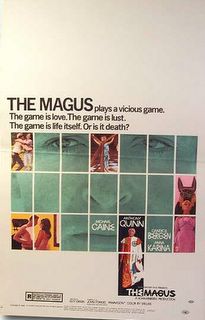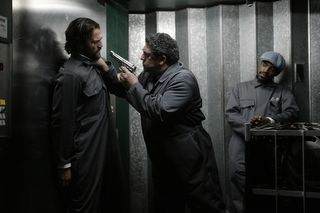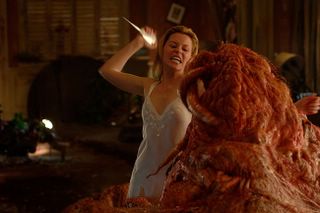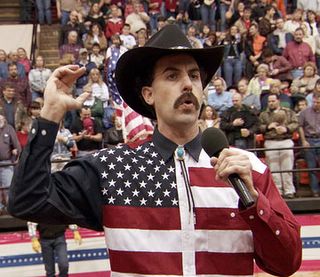By sheer coincidence, this week I have watched two of the worst films ever made. And they're similarly themed! I'd go so far as to say that The Magus and Revolver are bad in precisely the same way. They are imitation puzzle movies: hollow, meaningless exercizes pretending to slowly reveal secrets and deep, resonant truths.
Watching them moves beyond mere boredom and frustration and into an entirely new realm of cinematic ennui. You feel the simultaneous urge to shut the film off and to watch it 20 more times, absorbing every last turgid allusion and awkward visual metaphor. It's how I'd imagine fundamentalist evangelical Christian males feel about hardcore gay pornography. Repulsed at first, then darkly compelled, then horrified by their own curiosity.
The Magus
When asked what he'd change about his life if he could go back in time, Woody Allen replied that he'd do everything exactly the same "except for watching The Magus." That was a few years ago. I'm sure he could come up with a few additional regrets at this point. Curse of the Jade Scorpion comes immediately to mind.
But still, his point is well-taken. I can't speak for John Fowles' novel, which I have not read, but Guy Green's 1968 movie adaptation is clearly one of the most bafflingly terrible movies I have ever seen.

Michael Caine, a great actor who has appeared in a startling amount of Shit Cinema, stars as ladykiller Nicholas Urfe. He flees England to get out of a stale relationship with a world-weary flight attendant named Anna (Anna Karina), taking a job teaching English on a small Greek island. Wandering away from the schoolyard one afternoon, he finds his way to an isolated villa. There he meets the mysterious Maurice Conchis (Anthony Quinn), who speaks entirely in riddles and hypothetical questions. He's like a mincing, overweight Mediterranean Batman villain. (Zorba the Sneak! Count Olympus!)
His name is pronounced "conscious," by the way, in case you didn't realize that BIG IMPORTANT THEMES were being discussed.
Conchis makes up a ridiculous story about leaving England in shame during WWI, losing the heart of Lili (Candice Bergen), the only girl he would ever love. Though Conchis insists that Lili died in the Great War, Urfe starts seeing her wandering around the villa. How is this possible?
Urfe continues teaching and spends a long, romantic weekend repairing his relationship with the moody and unpredictable Anna, but he keeps returning to Conchis' villa. The film suggests that he's fallen in love with Lili (strange, considering she's either a mental patient or a ghost), but also that he's simply intrigued by the mystery surrounding his gregarious but shifty host.
It's not very convincing. I mean, would this guy really want to spend all his free time playing mind games with a bunch of fucking lunatics? Seriously, Anthony Quinn doesn't have a single sensical line of dialogue in the entire film. He never provides a single straight answer, until it becomes unclear why Nicholas would bother talking to him at all. Just ignore the doddering old man who thinks he's the bastard son of Socrates and Alex Trebek!
Nicholas could ask him his favorite flavor of ice cream and get a 10 minute monologue about the episotomology of identity in response. It would be like conversing with a Stephen Hawking book-on-tape. Yet the idealistic young teacher continually returns, even sacrificing some of his personal commitments and priorities just to go hang out in Wonderland. We must accept that he enjoys taking part in this nonsensical pageant for the movie to keep going. (In this way, it's not unlike Sleuth, another film in which an easygoing Caine character essentially humors a wacky older nutjob).
Most annoyingly, Conchis continually suggests alternative explanations for the strange goings-on at the villa, none of which seem remotely logical. Urfe always accepts these bizarre, stupid explanations without question, which makes his entire quest of discovery seem kind of pointless and haphazard. If he's willing to believe that Conchis is a therpist who's treating the schizophrenic Lili, or that Conchis is actually a shaman performing an ancient, mystic ritual on this island, then that means any explanation could be provided and confirmed.
As if being ponderous and self-satisfied weren't enough to satisfy Green's sadism, he's also made a film that's exceptionally cheesy and artificial, even by late '60s standards. Urfe has frequent visions (or are they?) of ancient gods, most of which look like burly Greek guys in store-bought costumes. Generally the outfits resemble Greek gods, but there's some random Egyptian-looking ones as well. Nice touch!
The frequent flashbacks serve no purpose other than to delay a film that's already excessively long and dull. The tastefully erotic sequences with Nicholas and Anna leaping through the Greek countryside, making love in the tall grass down by the river, reminded me of George Lucas' harlequin romance digressions from Episode II. I don't mean that in a good way.
Plus, I think Caine was wearing eyeshadow in some of these scenes. I'm sure that it's a whole brilliant metaphorical comment on some bullshit or another like everything else in this film that's laugh-out-loud ridiculous or jarring. Just thought I'd mention it because it makes the romantic scenes even more ludicrous and funny than they might be otherwise.
Revolver
Guy Ritchie must want to get out of the entertainment business. Maybe he's pulling some Max Bialystock-inspired scam requiring that his films make no money and insult the intelligence of all audience members. I'm grasping for some rationale, any rationale, for the one-two punch of Swept Away and now Revolver short of syphillitic dementia. (Hey, he is sleeping with Madonna every night.)
I don't think Lock Stock and Two Smoking Barrels or Snatch are towering cinematic achievements or anything, but they are clever, fun entertainments that I enjoy wholeheartedly. I've watched Lock Stock at least 5 or 6 times the whole way through, and have found new little things to enjoy each time.
How could he go from those smart little crime comedies to this reductive, bloated disaster in a few short years? I've read some reviews suggesting that his better half has been seducing him into that Kabballah BS and that's why the movie's so chock full of New Age-isms and bogus symbology. I don't have the answer to that question, but regardless of the cause, Revolver is really something to behold. A runaway cinematic trainwreck like this comes along maybe once a decade. I've heard rumors that Kim Jong-Il has in his possession all the necessary materials to create three pirated DVD copies of Revolver, and we in the Free World must do everything we can to keep such a powerful weapon out of the hands of that madman.

Why isn't this movie funny? Did Guy think we enjoyed him for his fabulous good looks? Snatch is funny, Lock Stock is downright hilarious. Very few movies are as quotable.
Ray Liotta is the only actor in Revolver who appears to have a pulse. Everyone else walks through the frame like a narcoleptic, dazed except for the few fleeting lucid moments during which they vomit out their next incomprehensible line of dialogue.
Nothing anyone does or says fits together into something resembling an actual story, but nonetheless a few plot strands eventually come into relief. Scruffy expert gambler Jake Green (Ritchie vet Jason Statham) is released from prison after serving 7 years. For complicated reasons, Green sees sleazy casino owner Macha (Liotta) as personally responsible for his sad fate, so he starts going to Macha's casinos and winning big. So Macha has a hit put out on him.
This all happens with dizzying speed in the film's first 10 minutes. Ritchie showcases some of the energy and flair of his previous crime films here, but also an gaudy, glossy artificiality that's new to this film on top of an excess of CGI backgrounds and effects. The movie's just ugly - too bright, busy and garish, like a P. Diddy video set in Willy Wonka's factory. Another big problem is Statham's incessant nattering on the soundtrack, largely made up of a few phrases repeated ad infinitum. Green's mile-a-minute inner monologue becomes important later on in the film, but that doesn't make it less obnoxious in these opening segments.
After the 10 minute mark, the film starts to drift away from reality. Green meets a peculiar pair of loan sharks, Zach (Vincent Pastore, better known as Big Pussy from "The Sopranos") and Avi (Andre 3000 from Outkast), who make him a confusing offer. They promise to protect him from Macha if he will turn over all his money to them and join their loansharking business.
Huh? Why wouldn't he just take all the money and skip town? And how does his presence tangibly benefit Zach and Avi? Why wouldn't they just take the money and kill him or leave him for Macha's goons?
Apparently, it's not supposed to make sense. That's just what happened to Green that set him on this voyage of discovery. Still, a clever writer might find a more reasonable way to involve Green with the two loan sharks, at least starting the film off in a way that's sensical and involving. The scene where Avi and Zach must convince Green to accept this ridiculous offer doesn't work at all.
I spent the whole time wondering why he'd possibly agree to such exaggerated terms, and then Statham plainly states that he knows it's a bad idea in the voice-over. There's breaking with reality to make a movie hallucinatory and dream-like, and then there's just making things happen because it is convenient for the moment and losing your film's narrative thread and sense of purpose.
David Lynch can get away with dream logic and non-sequiteur tangents because he's a great writer and a visionary. His movies are fascianting on a purely aesthetic level and they include characters who say interesting things or mundane things in an interesting way. Even if they are not 100% comprehensible at any moment, they are never boring or dreary.
After about an hour of establishing an underworld full of boring gangsters and criminals who don't crack wise or do anything entertaining, Ritchie starts dropping hints that some sort of mindfuck reality twist is coming that will upend all the prior action in the film. He abandons all that has come before in favor of an unbearably extended, surreal conclusion.
At this point, the movie shifts from a dull slog about gangsters to a dull and confusing slog about gangsters. Intentionally, the scenes start to get repetitive. (Hence the title.) The same three quotes keep flashing on the screen between sequences. The voice-over intrudes mid-scene to replay seemingly unrelated dialogue from the first 10 minutes of the film. Characters begin to talk in circles. Endless deals and double-crosses are established and carried out, but without any explanation or chronology. It's exceptionally hard to watch a film that has no point and continually repeats itself. How could Ritchie not realize that audiences would get bored by this kind of cyclical structure unless the filmmaking itself was lively and vital?
It doesn't take more than 10 minutes or so of the repetition to realize Ritchie's film isn't actually leading anywhere meaningful. Conflicts will just keep recycling until a random point in the pattern, and then the film will just end. It's pretty much inevitable, telescoped early on by both the title and by the characters' nihilistic outlook. Actions have no consequences, nothing they do matters, it's all a game, so how could these random events possibly build to a satisfying climax?
Green recalls how, while in prison, he got to know two peculiar men in the cells bordering his own. They communicated only by scribbling in shared library books, couldn't see one another's faces, but nevertheless devised a fool-proof escape plan and a number of fascinating logical theorems. Could Avi and Zach be these two men?
And what about their jailhouse plans for the World's Greatest Con? Green tells Avi and Zach of a formula he helped devise while in jail, a formula that would allow limitless powers of manipulation over other people? Could the action of Revolver be the actual workings of this scheme? Or is Green still in jail, slowly going insane and imagining what he'll do when he gets out?
Naturally, there's no actual twist, no switcheroo, no Shyamalan style reversals or Mamet-esque turnabouts. It's not for lack of trying. I think Ritchie actually throws every single tired, overused "psychological thriller" ending into the last 20 minutes of Revolver.
From Usual Suspects, he steals the concept of a shadowy, rumored super-criminal. Keyser Soze, meet Sam Gold. ($10 of green money if you can guess which character turns out to actually be Sam Gold. Think hard now.) He even lifts one of that film's most memorable lines, morphing "The greatest trick the Devil ever pulled was convincing the world he didn't exist" into "The greatest trick you ever pulled was making him believe he is you." It doesn't make any more sense after you've seen the movie. From Identity, he steals the "many different people are manifestations of the same unified whole" garbage. Everything else is pretty much Fight Club.
All these pseudo-endings and explanations are dangled in front of the audience, but none of them accurately reflect what's happening on screen in the last half hour of the film. Ritchie will show you a character's identity breaking down (at some points, it seems like Green and Macha are the same person), but then will go back to showing them as two separate people involved in business transactions and phone calls. Imagine if, after Ed Norton figured out that he was also Brad Pitt, they both still kept all their separate business meetings and dental appointments.
The Kabballah explanation has its compelling arguments. Ritchie definitely demonstrates an obsession with formulas, hidden symbols and numerical codes, so he's either been reading a lot of Jewish mysticism or Dan Brown novels.
Much of Avi and Zach's dialogue has a religious bent, urging Jake to re-examine the meaning of his life and to let go of his earthly desires. Just take a look at one of these voice-overs Statham's forced to suffer through:
There is something about yourself that you don't know. Something that you will deny even exists, until it's too late to do anything about it. It's the only reason you get up in the morning. The only reason you suffer the shitty puss, the blood, the sweat and the tears. This is because you want people to know how good, attractive, generous, funny, wild and clever you really are. Fear or revere me, but please, think I'm special. We share an addiction. We're approval junkies. We're all in it for the slap on the back and the gold watch. The hip-hip-hoo-fuckin' rah. Look at the clever boy with the badge, polishing his trophy. Shine on you crazy diamond, because we're just monkeys wrapped in suits, begging for the approval of others.
Once you get past the fact that Ritchie's clearly imitating Chuck Palahniuk's writing style (and not very well), what's left sounds like typical cult jargon. There's secret meaning behind your life that you don't understand. Stop seeking the approval of others, stop denying what you know to be true and realize that answers do exist to all of your super-secret questions. Forget about your stupid life and come join us! It's bliss!
Creepy. I don't really know enough about Kabballah to say for certain if this is accurate. Maybe Ritchie's just gone totally fucking sideways and his movies will be comprised entirely of nonsensical mutterings from now on. He'll be the cinematic equivalent to that scary hobo who lives in the alley behind your office building and occasionally throws Snapple bottles at you and yells about aliens disguised as department store mannequins.
[For some unimaginable reason, Fox will actually release The Magus on DVD this Tuesday. Revolver, on the other hand, is so pathetic, no American distributor will even put it out on DVD, despite the involvement of notable director Guy Ritchie and famous actors Jason Statham, Ray Liotta and Andre Benjamin. It came out in 2005 in Britain and may never see the light of day in The States. This is one of those rare occasions when I can praise our corporate masters for their sound judgement, keeping this film off of our shores and out of the hands of our impressionable young people.]











